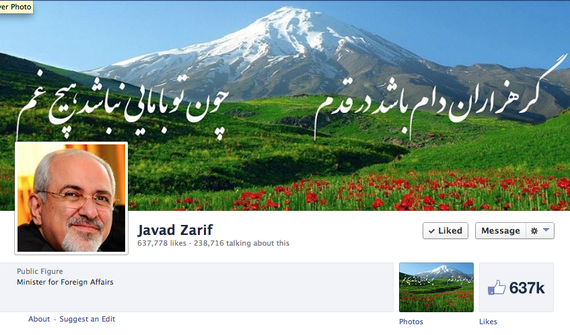Most Iranians are socio-politically conscious and opinionated about issues that rise in the news.
Each Iranian is indeed a political analyst, socio-psycho expert and an arts and culture savant.
Although the common view is that the Iranian people are restricted in expressing their opinions, the dialogues taking place in grocery stores, taxis, etc. are indeed open, livelier, more interesting and much more constructive than the ones in the virtual world.
However, social media provides a new and exciting platform for Iranians to express their opinions and engage in steamy discussions about topics of the day from soccer to politics and yet it doesn't fully reflect the social atmosphere in the real world, it could give us a better sense of what's being said in the real world.
It wasn't long after the election that President Rouhani and his foreign minister Javad Zarif surprisingly opened Facebook and Twitter accounts for sending their conciliatory comments to the world while not acknowledging that the sites are blocked in Iran and their comments cannot be viewed by their own people.
On Monday, September 16th, the block was briefly lifted by what the authorities believed to be a "technical problem." Celebration for the day of "free filtering" didn't last long and filtering continued to be a challenge for young Iranians to access their social media accounts.
Iranian youth don't bother themselves with such restrictions and they manage to find a way around it and talk to their foreign minister on his Facebook page.
Zarif knows how to use Facebook to engage his audience. Either by writing inspirational poems by Rumi or giving daily reports of his activities and trips.
The comments on his statuses can be seen as a miniature of a young society bursting with dreams, aspirations, and of course opinions.
In his last status, he writes, "In the past couple of days, we had nearly 6 hours of intensive talks with Ms. Ashton and hours of formal and informal discussions with members of 5+1. They had several hours of negotiations among themselves to reach consistency in their position.Negotiations are going well, but a few cases of disagreement remain."
There are about 11 thousands comments under his status varying from funny little notes to poems, analyses, expressing farewell, and advising him what to do.
The comments don't seem to be moderated as there are harsh criticisms towards Ayatollah Khamenei among them asking Zarif to think about the Iranian people not the personal preferences of the supreme leader.
There are thousands of pleading comments urging foreign minister Zarif to reach some kind of agreement before tougher sanctions are imposed.
One comment read: "Mr.Zarif, we really don't want an enriched uranium. All we want is a little bit of peace and calm."
Earlier this week, in a YouTube message, Zarif addressed the importance of mutual respect and dignity. Al though there were some criticisms of why he doesn't address people's right to have free access to social media Websites such as YouTube, his defenders try to highlight the fact that removal of filtering does not fall into the scope of of the foreign minister's responsibilities and such "marginal discussions" create "unnecessary" aggressions.
The comments and reactions are too many to read , but skimming through them all sends out only one clear message to the foreign minister and to the world leaders: Its not the uranium that people are concerned about, it's "Iran"ium.
